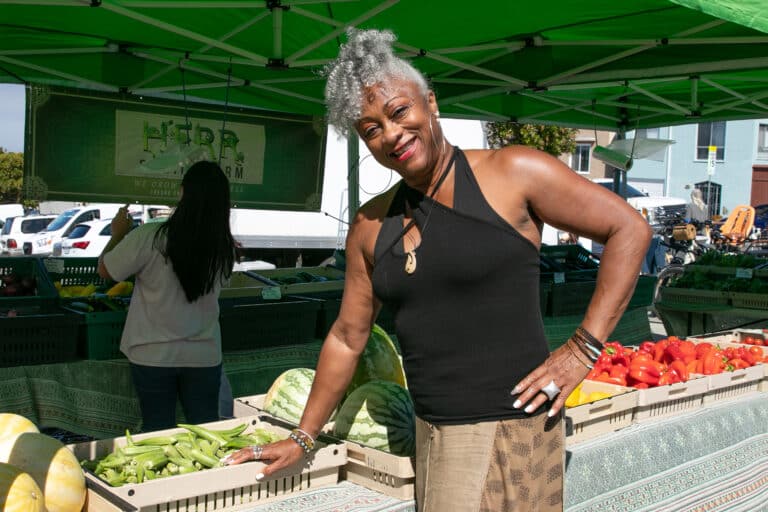|
Getting your Trinity Audio player ready...
|
Diane Spivey’s book, “At the Table of Power: Food and Cuisine in the African American Struggle for Freedom, Justice, and Equality” (available on Amazon), is a detailed history of how Black chefs, African and African American cooking informed the foundation of American cuisine.
“This book answers the question of how and why the American culinary narrative has trivialized the African and African American contributions to American cuisine and what the implications are for correcting the narrative for the future,” says Spivey.
This is the second book from the culinary historian, who has devoted more than 40 years to studying and recording African American food traditions and cooking.
From Africa to the Americas
“Africa is the cradle of civilization and therefore the cradle of cooking and cuisine,” shares Spivey. She continues, “Africans spread out to all corners of the globe, and wherever they went, they took their culinary practices with them. Just some of the crops brought to the Americas from Africa include beans, okra (gumbo), peanuts (goobers), watermelon, yams, coffee, bananas, palm oil and rice. And those crops were brought to the Americas, along with enslaved Africans, to plant and harvest them.”
- MOFAD Celebrates History with African/American: Making the Nation’s Table
- My Black Food Story – Okra and Me
After harvesting those crops, enslaved Africans were also expected to cook them. Historically, Africans were never given credit for their agricultural or culinary expertise because they were still looked upon as enslaved, and consequently, what belonged to the enslaved person ultimately belonged to the enslaver.
“France reinvented itself by turning its poverty of culinary resources into a virtue,” notes Spivey. “Then France claimed to be the king of cuisine as if nobody could cook but the French,” she continues. So America began to adopt “French flair and technique” to define how cuisine should be prepared.
Black Chefs, Caterers and Creators of American Cuisine
Just after the end of the Civil War, newly freed Africans and African Americans were trying to find jobs to make a living and one of those jobs was cooking. In fact, during and after slavery, Black women were the ones who did all of the cooking for White families. Whenever White elites wanted to show off for their local and international guests, they made sure a Black person cooked their food.
But because of sexism during that era, the catering jobs went to more Black men than women. In fact, some of the Pullman Porters, during the heyday of train travel, turned their cooking, serving and customer service skills into catering jobs.
Even then, many of those men were called “waiters” instead of being given the more prestigious title of caterer. Still, the book notes, “from the rural country kitchen and steamboat floating palaces to marketplace street vendors and restaurants in urban hubs, Africans in America cooked their way to positions of distinct superiority, and thereby became indispensable.”
Two of those indispensable chefs were enslaved. Hercules Posey (called Uncle Harkless) and James Hemings were responsible for building the culinary reputations of presidents George Washington and Thomas Jefferson, respectively.
According to the book, “they not only contributed tremendously to the evolution of American cuisine, they were also instrumental in sowing the seeds for the developments of what America refers to as ‘fine dining.’”
But cooking became a money maker for White America in the 20th and 21st centuries, particularly after 1976, when chefs were reclassified and cooking became an arm of the entertainment industry. And, little by little, Black chefs were pushed out.
Beyond Soul Food
The book even includes some of the recipes from these caterers. But Spivey warns, “A lot of the recipes have to be interpreted where you add your own instructions to them because they are not fully instructed the way we do recipes today.”
The book notes that many White women published cookbooks that were actually recipes from their Black cooks, who were conveniently left out of the books. Spivey calls this “culinary apartheid” — the theft and re-assigning of Black culinary achievements to whites. Spivey says that pushes what African American chefs are credited for to the very narrow box of “soul food.”
RELATED: The Cooking Gene Spices: Michael Twitty’s Tribute to Black Culinary History
This brings us to the book’s epilogue, where Spivey honors the late chef Edna Lewis of New York. “There’s a lot that I love about her, and one of them is that she doesn’t like the term soul food, and I don’t either,” declares Spivey.
“Yes, we made delicacies out of the scraps that were given to us when we were enslaved. But our cooking can’t be put in a box because Blacks were the primary cooks and chefs for the rich and elite in every culinary setting,” she exclaims. “That’s why we have to be in control of telling our own culinary history.”











